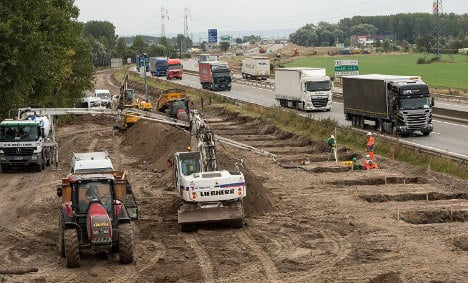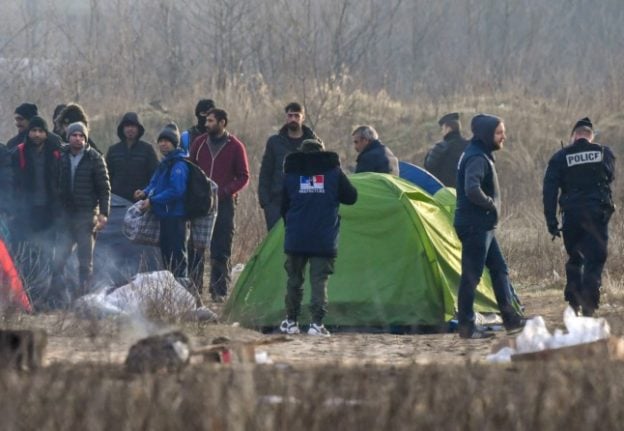The British-funded wall, dubbed the “Great Wall of Calais” and set to stand at one kilometre (half a mile) long and four metres (13 feet) high, will pass within a few hundred metres of the sprawling migrant camp known as the “Jungle”, which charities say now houses more than 10,000 people.
The concrete wall will extend the wire fences that already run down each side of the main road leading to the city's port.
 (AFP)
(AFP)
It has been widely criticised by rights groups and by local residents who say it will fail to stop migrants from trying to board trucks.
Britain is paying the €2.7 million ($3 million) cost of the wall, which local authorities in Calais say will be completed by the end of the year.
The Jungle camp has become a sore point in relations between France and Britain, the main destination for most of the migrants who gather there.
Migrants from the camp sometimes use tree branches to create roadblocks to slow trucks heading for Britain.
When the trucks slow down, migrants try to clamber into the trailers to stow away as the vehicles head to Britain through the Channel Tunnel or on ferries.
Just last week, a 14-year-old Afghan boy was killed by a car in Calais as he tried to get onto a truck.
 (AFP)
(AFP)
'Money down the drain'
French Interior Minister Bernard Cazeneuve said this month the Jungle would be closed down “as quickly as possible” but said it would be done in stages.
Calais residents want the government to set a date for the entire camp to be razed.
Local authorities say the wall is also designed to dissuade people traffickers from operating around the Jungle.
It will be made of concrete panels that can be removed when no longer needed.
“This wall is going to prevent migrants from getting onto the road every night. They put tree trunks, branches, gas cylinders” in the road to stop the trucks, Calais port chief executive Jean-Marc Puissesseau said earlier this month.
“We can no longer continue to put up with these repeated assaults,” he said.
But critics of the wall have compared it to those erected by central European countries to block the entry of migrants from southern Europe.
 (AFP)
(AFP)
Others say it is pointless.
Francois Guennoc, vice president of the L'Auberge des Migrants charity which works with Jungle residents, said to be effective the wall would have to stretch for dozens of kilometres. It was “money down the drain”, he told AFP.
The Jungle's population has increased by more than 1,000 since August to more than 10,000, charities said Monday.
The figures are disputed by French authorities, who according to the last official count on August 19 put the number of migrants at 6,900.
Migrants from Sudan make up the largest group at 43 percent, according to L'Auberge des Migrants and the British non-governmental organisation Help Refugees, while 33 percent are from Afghanistan.
Around nine percent are Eritreans and seven percent are Pakistanis.
The charities also noted an alarming rise in the number of minors in the camp with 1,179 now living there, and they noted that most were unaccompanied.
The youngest was just eight years old.



 Please whitelist us to continue reading.
Please whitelist us to continue reading.